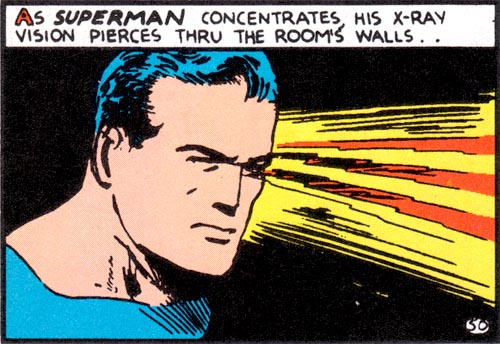Dear Professor Gavaler,
I am a biologist at the University of Oklahoma, currently writing a review paper about our research on sensory processing by weakly electric fish in South America and Africa (a major focus of my research program). In this review, I have drawn an analogy between the electrosensory abilities of weakly electric fish and X-ray vision in superheroes like Superman. One of the points that I am trying to make is that extraordinary sensory capabilities also carry high liabilities. In the case of electric fish, the metabolic demands of generating electric fields leaves them extremely vulnerable to low oxygen and low food availability.
I would like to complete the analogy by referring to the costs/curses that usually come with the superpowers possessed by superhero characters, but I need a scholarly source(s) to back up this claim. My initial literature review has turned you up as the leading expert on superheroes in literature and pop culture. So, I’m writing to ask it you could refer me to any work of your own or work by others that discusses the sometimes costly tradeoffs that come with superpowers.
You can find more about electric fish and our research at my lab website if you are interested.
Thanks in advance for any help you can offer. I was fascinated by the reading I did from your most recent book!
Sincerely,
Michael

Michael,
You have an interesting project, and your analogy is apt. The notion that a superhero’s powers are also a curse has been a standard of the genre since the early 60s. I don’t believe it applies to Superman or most other WWII-era heroes, but Marvel Comics popularized the idea with characters like the Fantastic Four, Spider-Man, and the X-Men. Often the curse is more psychological–the moral obligation that, as Stan Lee phrased it, “with great power there must also come–great responsibility!” The self-sacrificing curse comes in other forms too. The Thing, for example, routinely saves the world, but his powers also make him look like a grotesque monster.
Since your analogy is biological, Daredevil may be a better example. In the 1964 premiere, Matt Murdock saves a pedestrian from being struck by a truck carrying radioactive material. As a result of the exposure, Murdock gains bat-like radar but he’s also blind. He can’t have one trait without the other. In some sense, this does apply to Superman then–if you think of kryptonite as his liability. Being from Krypton gives him a range of extraordinary powers, but it also means he’s extremely vulnerable in this one area, while normal humans are unaffected by kryptonite. The film Unbreakable does the same thing with Bruce Willis’ character, who is invulnerable–except he can easily drown.
If you need a citable source, I touch on this briefly in On the Origin of Superheroes. On page 38: “And the whole tragic twist of Marvel’s Silver Age heroes–that superpowers are both blessing and a curse–comes down to one word, “barak,” from Job 1:5. It means both ‘bless’ and ‘curse.'” I also spoke a year ago with journalist Jim Rendon about a similar idea for his book on post-traumatic growth syndrome. I don’t know if his book is published yet, but I wrote about it in more detail here.
Let me know if any of that helps.
Best,
Chris

Hi Chris,
This is very helpful. Thanks so much for sharing your perspective on this issue. I think you’re right that Daredevil is probably a better example (I just started mass-consuming the Netflix version a couple weeks ago). But, I think we will still stick with Superman just because he is an example more familiar to a general audience. Your pinpointing of the tradeoff for Superman is spot on.
I ordered a copy of your book (it was released too recently for our library to have a copy) and I look forward to reading it. We will probably cite it as a reference for our paper, and may include a personal communication reference based on your email (I will get your permission first if that is the case). I will definitely send you a copy of our paper when we have it completed.
Thanks again for your help! Much appreciated.
Best,
Michael

Glad I could help, Michael. And, yes, you have my permission to quote our email correspondence too. And would you mind if I included our correspondence in a blog post?
Btw, the Netflix Jessica Jones is even better than the Daredevil (and her powers create some major liabilities).
Chris

Hi Chris,
It would be absolutely fine to include our correspondence in your blog. I will follow up in a couple weeks when we finish the paper we are currently writing. This project has me intrigued by the parallels between superheroes and animals with extreme adaptations in biology. A core principle in evolutionary biology is the notion of the adaptive tradeoff – traits that carry a large adaptive advantage in one capacity also come at high costs (e.g., metabolic, reproductive, or survival).
Best,
Michael

